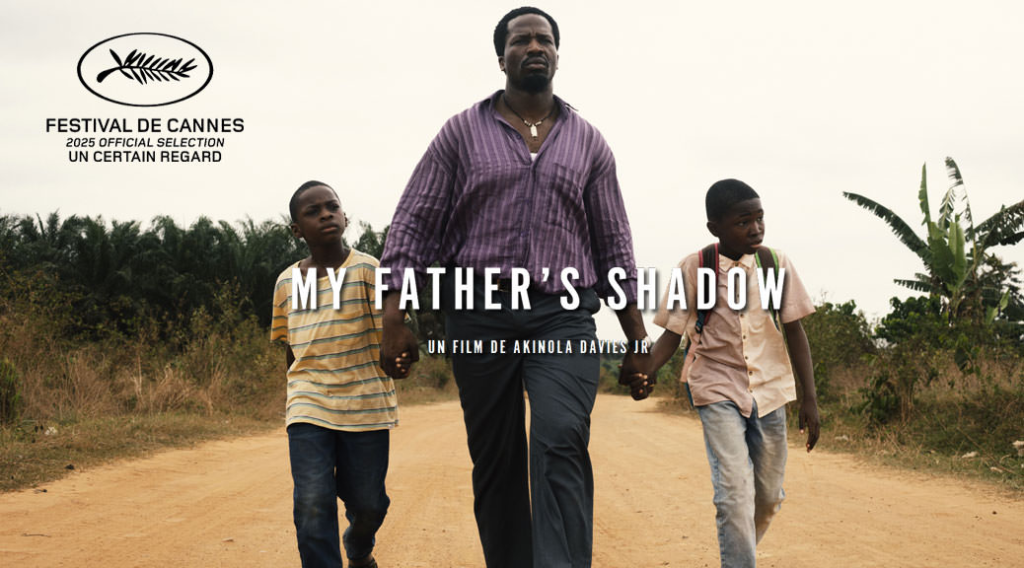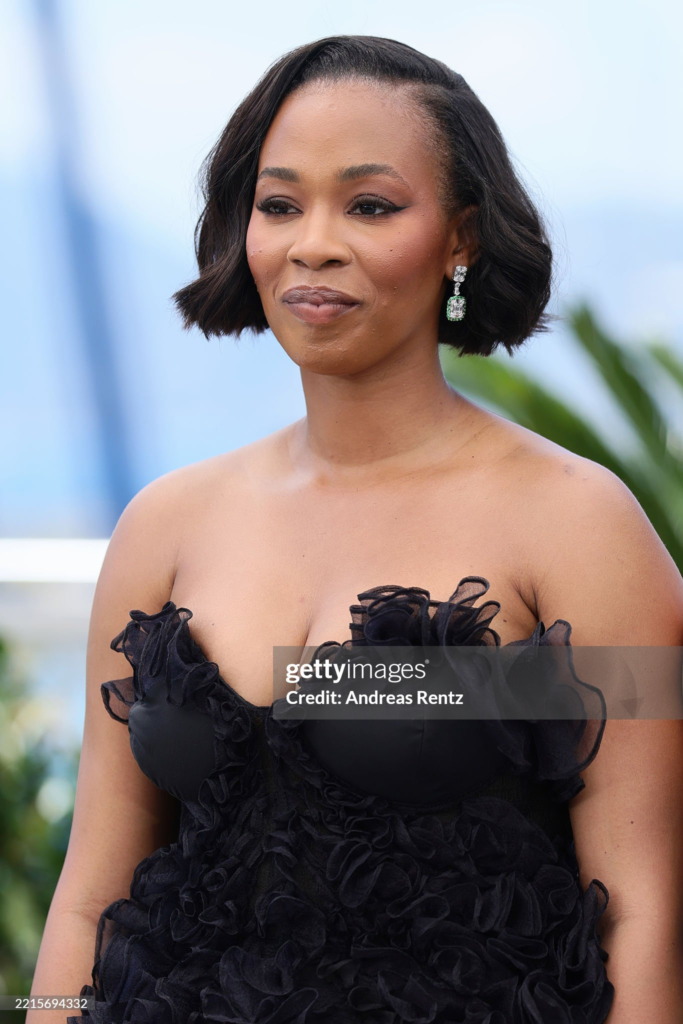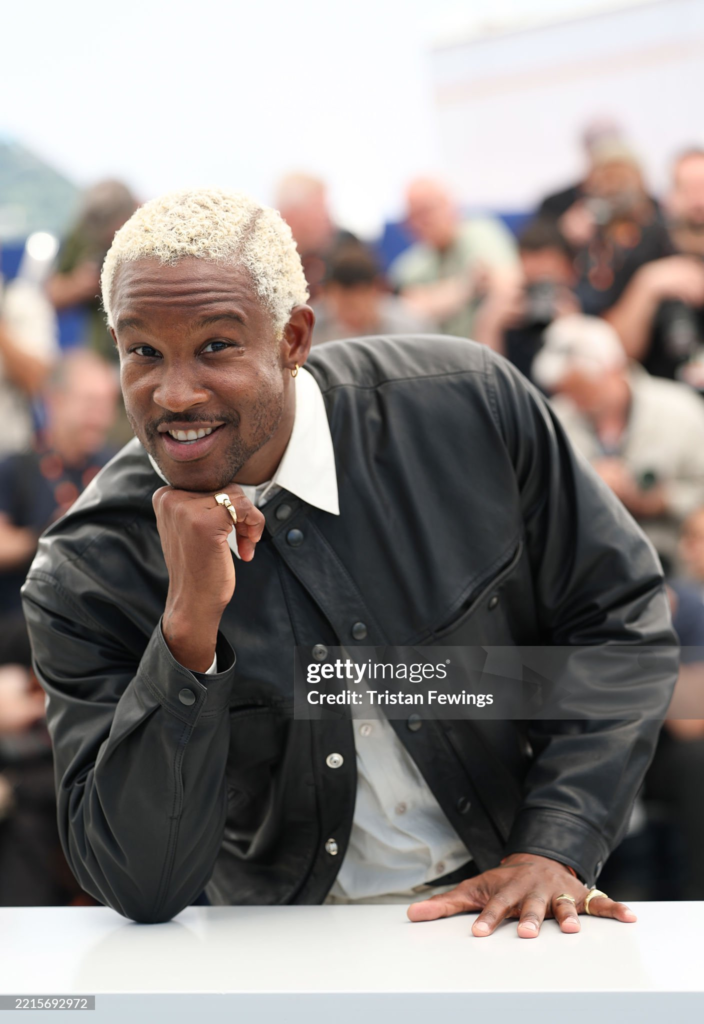
Hoping to drive conversations around Fatherhood and Nationalism, filmmakers Akinola Davies Jr. and Wale Davies premiered their feature at the recently concluded Prestigious Cannes Film Festival on Sunday May 18th 2025.
Retrospectively for Wale Davies, the events of June 1993 in Nigeria and their aftermath can be distilled and splits into two significant parts;
“The collective groan of a nation on (theday a much-awaited Presidential election was forcibly annulled) and the collective cheer when we won the African Cup of Nation tournament in 1994, just a year later,” he says.
Davies was 11years old in 1993 when General Ibrahim Banbagida cancelled a democratic election that M.K.O Abiola had won, and incited months of deadly protests. Decades later, Davies, along-side his brother Akinola Davies Jr., returned to that period in My Father’s Shadow, a semi-autobiographical retelling of the events of June 1993, through the eyes of a father and his two sons.


These moments showed Davies how the actions of a few could dampen or uplifts the spirits of a whole nation and raised questions about the small, untold stories in the background as the events played out.
Written and directed by Davies Jr. and co-written by Davies, My Father’s Shadow premiered at the just concluded Prestigious Cannes Film Festival on Sunday, May 18th in the “Uncertain Regard Selection”. It is the the first Nigerian film to be officially selected by Cannes, and was snapped up by Cinephile platform MUBI even before it arrived at the festival.

Sope Dirisu

Funmi Ogunbawo

Akinola Davies Jr.

Godwin Chimerie Egbo

Chibuike Marvellous Egbo
The film, which marks Davies Jr’s first feature since his Sundance prize-winning short Lizard, plays out over that pivotal day in what was once Nigeria’s capital city, Lagos, but bears implications that trickle through generations. The story follows an estranged father (Sope Dirisu) who takes his two sons (played by Godwin Chimerie Egbo and Chibuike Marvellous Egbo) on a journey to the big city and the political unrest that endangers their return home.
While political discord might form the architecture of this film, its brilliance comes from the quiet moments it manages to collect in the middle of the Chaos. The film explores the intricacies and nuances of a father torn between duty, love, hope and despair. My Father’s Shadow is most poetic when it focuses on the mundane amidst consequential events. Although we can tell the nation is on the brink of a new dawn, the camera follows the minutiae of everyday life for this family.
“We see the tree sing, the land breathe, the hours passed along with the form of a day tinged with meaning. I think I am quite obsessed with the experience of being”, he says. This propensity for glorifying the everyday is a well-developed perspective inherent in many of Davies Jr’s Works.
“The mundane is really about how you perceive it,” he adds. “To live life in a black body, some days you feel like you’re in a romance. Some days you hear Sirens and feels like you are in a horror movie. How those moments make you feel you can bring magic to the simplicity in life that gets overlooked. And what we’re trying to say is that those moments matter.”
According to the Davies brothers, this story is a way to make sense of the loss of a father they didn’t know very well. Their father passed when Davies Jr was 20 Months old, and unlike their older siblings, Davies and Davies Jr didn’t get to spend enough time with him. They were also deeply intrigued by the moments in Nigerian history that are often overlooked and under-explored in art.
Surely, we’ve heard about key moments in our history but as an adult, i’m curious about what the people [who lived through that time] felt. Mining into June 12, which I say from a child’s perspective at age 11, and speaking to guys who were on the front line, who were in the student union, who were marching, who were angry, who were angry, it was a process of Self-discovery,” Davies says.
“On the one hand, we were mining memory because we lived it, and we had a lot to mine from, but it’s also just trying to portray the reality of what it means to be Nigerian,” Davies Jr. adds. “It’s peaceful one moment, and it’s chaotic the next. In addition, we did a lot of research about that period to try and understand what it was like from a more adult and political perspective. But the joy of being artist and creators is that we have the creative license to expand that and make that feel much more synonymous with the themes of what we’re trying to do. [And] What we’re trying to do is to tell honest stories,”
With history once removed as a subject in Nigerian schools, art remains the only place where the past can be revisited and turned to for meaning. “We don’t have enough resources and access to people’s emotions, thoughts, and feelings at specific moments; we get it in summary notes,” he adds, “it was just super interesting for me because within that discovery is where the magic is. You can tell a real story and honor people and we have such rich material to build from.”
Davies (a record label head and second half of the Nigerian hip-hop duo Show Dem Camp) and Davies Jr (a multidisciplinary artist) havefundamentally different disciplines, but it didn’t hinder their creative collaboration. “I think our trajectories have been relatively similar,” Davies Jr admits. “We grew up together and I think [We share] a lot of morals and ambition. The way we see the world, and how we want to relate to people, is fundamentally from a shared place. Beyond that, we’re very social and like to create communities,”.
And much of the driving force behind their work, Davies Jr. says, is borne from a duty to serve and create for, and alongside, that community. My Father’s Shadow is a work born from a community of friends and close collaborators determined to make something outstanding. The pair worked on the script for the film for several years before finalizing the story in 2020.
This process was made easier because, despite their varying disciplines, the Davies brothers are highly accomplished storytellers. “Whether it’s in music or whether it’s in visuals or narrative, and even in the way we speak..Listen to Wale talk, he definitely takes you on a journey and paint such vivid pictures, and its adept at doing with words whereas I might be more adept at doing with pictures. There is a sense of passion for what we do, which translates to how we collaborate,” Davies Jr. says.
Also central to their core of the creative partnership is a deep sense of familiarity that makes honesty and truth-telling possible. “We can tell when the other might be lying or hiding something. If truth is at the core of our collaborative practice, it’s a good springboard for allowing ideas evolve and marinate. Davis Jr. adds.
Both Davies and Davies Jr. are aware of the weight they carry as they represent Nigeria in making its Cannes debut. But they are letting the pressure rest on how the quality of work is received and not solely on what it represents. “I’m more excited about people watching the film,” Davies says. “As much as I enjoyed the hype and accolades, it’s really about the work. When it finally goes out into the world, the whole conversation changes, and hopefully some of the dialogue intended for the film can finally kick-off.”
The dialogues Davies speaks of are “Mainly Fatherhood and what that means. It’s always been this balance of trying to work to provide for your family, and this idea that you are the provider versus your presence and your time. The question will be, “how do you achieve that balance when the realities are even more stark?”, he asks. “And then nationhood as well; just the concept of what your nation means and what it’s meant to provide. There are other deeper things that I want people to catch when they watch.”
Davies Jr. describes it as a privilege. “It’s a real honor. We just wanted to make something that we feel extremely proud of, that shows the Nigeria we grew up in on screen,” he says. “As long as we’re proud of what we’ve done, I think the rest is just a bonus that is still a massive honor and something we don’t take for granted.”
AKINOLA’S DAVIES Jr.’s “MY FATHER’S SHADOW” RECEIVED A SPECIAL REMARKABLE RECOGNITION AT CANNES FILM FESTIVAL
The FIRST Nigerian film to be officially selected by the Cannes Film Festival has earned praise for its technical brilliance, emotional depth
Akinola Davies previous film LIZARD Trailer
LIZARD THRILLER CONTINUATION
Sundance Film Festival
This ground-breaking African films explore queer experiences with nuances and authenticity, challenging societal norms while celebrating the universal search for love and belonging.
My Father’s Shadow has made even more history at the Cannes Film Festival after it received a Special Mention for the Camera d’or Prize. The award is presented to be the first feature film in the Festival’s official selections. Hasan Hadi’s The President’s Cake won this year’s Camera d’or, making Hadi the first filmmaker from Iraq to win a feature award at the Cannes.
The Special Mention reserved for My Father’s Shadow is a testament to its outstanding execution and compelling portrayal of a pivotal time in Nigerian history. “We just wanted to make something that we feel extremely proud of, that shows the Nigeria we grew up in on screen,”
My Father’s Shadow, the FIRST Nigerian film officially selected by the Cannes Film Festival to screen in the “Un Certain Regard section, has been accruing rave reviews from critics and viewers alike. Co-written by sibling duo Akinola Davies Jr. and Wale Davies, the film is set on the day one of Nigeria’s freest and fairest presidential elections was annulled.
The backdrop heightens the stakes for a film that centers on the relationship between a father and her two sons. Directed by Davies Jr., My Father’s Shadow stars Sope Dirisu as Folarin, a father who’s often away for work for months at a time, hovering in and out of the life of his two sons, Akin (Godwin Egbo) and Remi (Chibuike Marvellous Egbo).
Nearly two weeks after the election that Folarin hopes will change Nigeria for good for him, and his sons, he decides to take Akin and Remi on a trip to Lagos for some bonding, amidst the spectacle of socio political chaos. Their time together sees the wide-eyed boys navigates roads with stilted options due to fuel scarcity, conversations with men calling their father “Capo,” discussions about Folarin’s relationships with their mother, and moments encapsulating the distance and mystery between sons and many African fathers.
The film has been earning praise for its poignance, affecting depth, technical brilliance, and great praise for the acting performance by Dirisu and the Egbo Brothers. Film journalists Brian Tallerico described My Father’s Shadow as “a special movie” that “left me emotional and speechless.” CNN’s Thomas Page called the film “beautiful”, praising the lyricism of Akinola Davies Jr’s Storytelling, and also spotlighting Dirisu’s performance as “Heartbreaking”.
Film journalists Robert Daniels wrote on X that Davies Jr.’s film is “currently the best thing I have seen” at Cannes, while his review on Roger Ebert praised My Father’s Shadow as a “masterwork by a first-time director whose crafting of an epic scope and sense of tender intimacy makes for another new peak for African Cinema.”
Rating the film a four out of five stars, The Guardians Peter Bradshaw praised David Jr.’s approach to the “transparent personal project,” referring to the film’s semi-autobiographical basis and praising it’s emotional heft. For journalists David Ehrlich, writing in indiewire, the film’s heartfelt nature is greatly helped by the casting of the Egbo brothers,” both of whom brings an unmistakably lived-in quality to their sibling dynamic,” and the precise balance between the Davies brothers’ script and Dirisu’s performance.
There’s been excitement since it was first announced that My Father’s Shadow premiered at the Cannes Film Festival and I was indeed a joy to behold. The streaming service MUBI acquired distribution rights for North America, the U.K., Ireland, and Turkey in February 2025.
Wale Davies previously said he was more excited about people having to get to watch the film and that’s it was really about the relentless work for him not even the hype or accolade that serenaded the film’s debut on Cannes.

